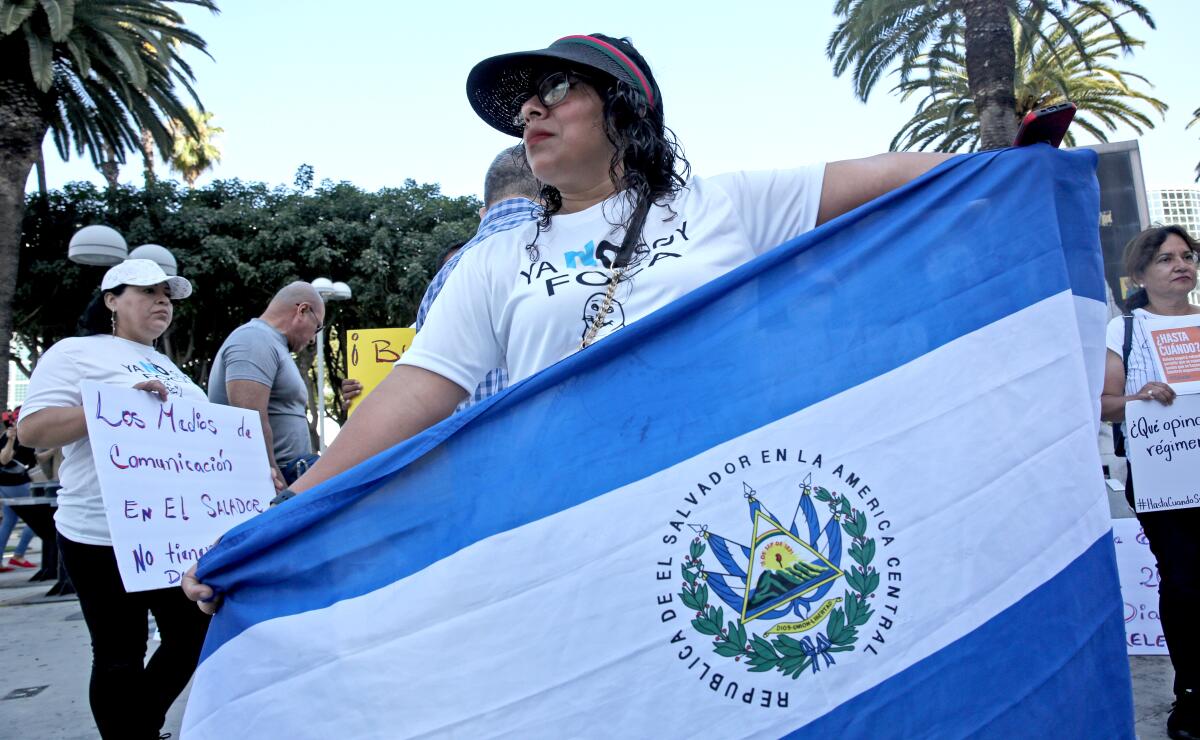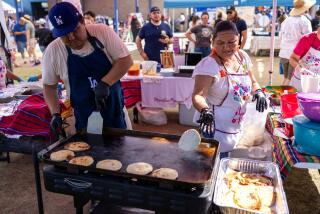‘No more dictatorships’: The slogan that rings in the streets at the start of the Summit of the Americas

As many of Latin America’s leaders gathered Monday in Los Angeles for the start of the Summit of the Americas, a handful of immigrants and their supporters took to the streets, waving flags and posters to vent their political differences with their countries of origin.
The prevailing message? No more strongmen. No more mano dura (firm hand).
“We don’t need countries where dictatorships exist,” shouted a group of Nicaraguans gathered at Figueroa Street and Pico Boulevard in front of the Los Angeles Convention Center, the summit’s main venue. “No more dictatorships in Latin America!” they yelled in Spanish.
A few yards away, Salvadoran protesters echoed the refrain: “We do not want dictatorships!”
Nearly all of Monday’s protests outside the Convention Center targeted either El Salvador’s Nayib Bukele or Nicaragua’s Daniel Ortega. Los Angeles is home to an estimated 425,000 Salvadoran Americans, the largest concentration in the United States, and an estimated 39,000 Nicaraguan Americans, according to census figures.
The political realities of Nicaragua and El Salvador differ in certain ways. Nicaragua is ruled by a former Marxist guerrilla leader; El Salvador is governed by a populist former mayor and businessman.
But some Central American immigrants who now make their homes in Southern California believe that, for all their dissimilarities, Ortega and Bukele are mirror images. And the tactics used by their stateside critics likewise resemble each other’s.
In 2018, Grettel Campbell created the organization Nicaragua Libre L.A. following waves of protests over changes in the social security system that were violently repressed by the Ortega government, leaving more than 300 dead and thousands injured and exacerbating international concerns over human rights violations.
“The objective is to denounce,” said the native of Managua, the capital, and now an L.A. resident. “The main objective is to get Ortega out.”
Twenty years ago, Dámaris Rostrán left Nicaragua for New York. Today she is one of the leaders of the New York and New Jersey Work Table organization, part of a network of 23 U.S. entities raising awareness of events in Nicaragua.
“The United States needs to turn its gaze towards Latin America,” said the activist while standing at Figueroa and Pico.
Pointing to a group of Salvadoran demonstrators a few feet away, Rostrán said the type of political repression that has long gripped Cuba, Nicaragua and Venezuela is also pressing in on El Salvador.
“What Ortega has done in 10 years, Nayib Bukele has achieved in two,” said Rostrán, a Managua native.
The Summit of the Americas, created in 1994, is intended to assemble the continent’s heads of state, civil society organizations and civic leaders around shared regional goals, including the promotion of democracy and human rights — at least in theory.
But this year’s summit has been shrouded in controversy and acrimony after the United States did not invite Cuba, Venezuela and Nicaragua, and the presidents of Mexico and Honduras subsequently chose not to attend in protest against their counterparts’ exclusion.
President Bukele remains highly popular, both at home and among Salvadoran Americans, and his followers support the heavy-handed measures implemented by his government. In a recent survey conducted by Central American University, 66.2% of respondents said the Bukele government’s mass roundups had improved security. But 24.8% regarded such measures as an attempt by the government to burnish its popular image.
“How long will the arbitrary arrests be?” asked Salvadoran Ana Flores, carrying a sign written in English and Spanish.
“Bukele has my brother in prison,” read another poster, carried by Álex Henríquez, who said his sibling had been detained under the current state of emergency implemented at the end of March, which human rights advocates and media reports contend has led to the arrest without a court order of thousands of alleged gang members as well as many innocent people.
Amnesty International recently denounced the emergency order, under which it said more than 36,000 people have been captured, “massive violations of human rights” have been committed, including cases of torture, and at least 23 people have died while in captivity.
The Salvadoran group Democratic Diaspora in Resistance has placed those allegations at the center of its messaging campaign.
“How long will Bukele continue to violate the fundamental rights of Salvadorans?” read one billboard on a small moving van-like vehicle on Figueroa Street. For eight hours that message was seen as the vehicle cruised along the Salvadoran corridor to the consulate of El Salvador on Wilshire Boulevard, as well as passing by the Convention Center.
Lorena Aguilar, a resident of San Jose and a Democratic Diaspora in Resistance member, traveled with a group of activists who are worried about the direction of their native country. Since the collective was created in June 2021, people living in Canada, Mexico and U.S. cities including Washington, Oakland, San Francisco and Los Angeles have joined.
“Some businessmen in Washington, D.C., donated the money to pay for the billboard. That has helped us carry the message in a more effective way,” she said.
The group also has had an impact in El Salvador by collaborating with teachers and lawyers to coordinate efforts to assist those who’ve been arbitrarily detained by the government.
“We are uniting across the United States, Canada, Mexico and Europe. We have representatives who are grouping Salvadorans who do not agree with the regime,” Aguilar said.
Edith Anaya reached out to the group on Twitter, where for many years she had posted her political views. Upon learning about the planned protest at the summit, she decided to join.
“It is necessary to move from Twitter to action and unite to express our concern,” she said. “It is very important that the international community knows that the government is lying when it says that there is a democracy and that it respects human rights.”
Taking advantage of the opening of the summit, other members of the Latino and Latin American communities came forward to promote the issue of immigration reform. One young Salvadoran, Obbi Fénix, said he felt uncomfortable being surrounded by opponents of Bukele and Ortega.
“I don’t agree with them,” he said, referring to his countrymen and indicating his sympathy for Bukele.
“What I ask Nicaragua is to extradite Mauricio Funes and Salvador Sánchez Cerén,” Fénix said, referring to the two former leftist presidents who governed El Salvador between 2009 and 2019 and to whom the Ortega government has granted Nicaraguan citizenship.
As the anti-Bukele protests began to wind down, a small pro-Bukele faction briefly made an appearance on Figueroa Street.
“Long live Bukele!” they shouted before briskly crossing the street.
A woman with the anti-Bukele group immediately replied in a firm voice.
“Long live,” she shot back, “but outside of El Salvador.”
More to Read
Sign up for Essential California
The most important California stories and recommendations in your inbox every morning.
You may occasionally receive promotional content from the Los Angeles Times.









